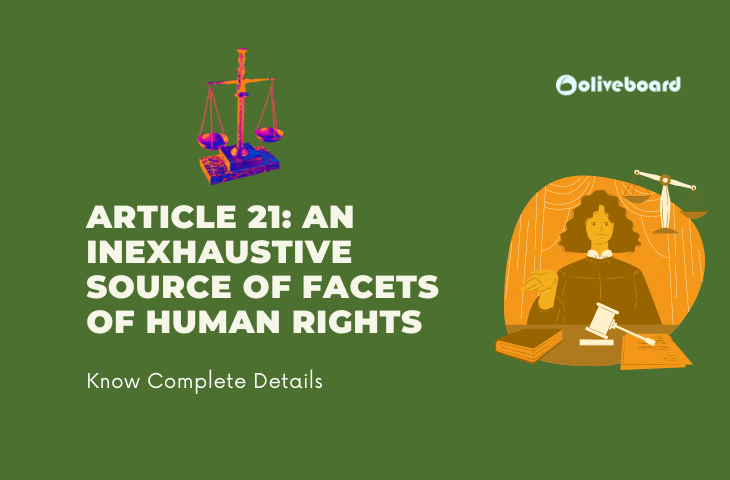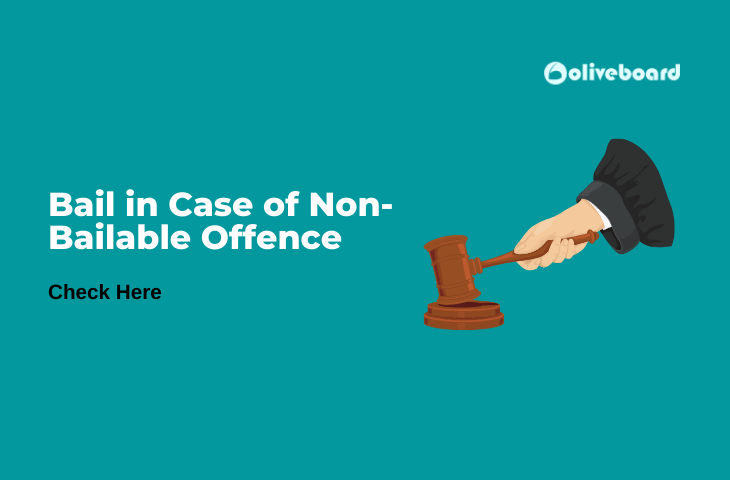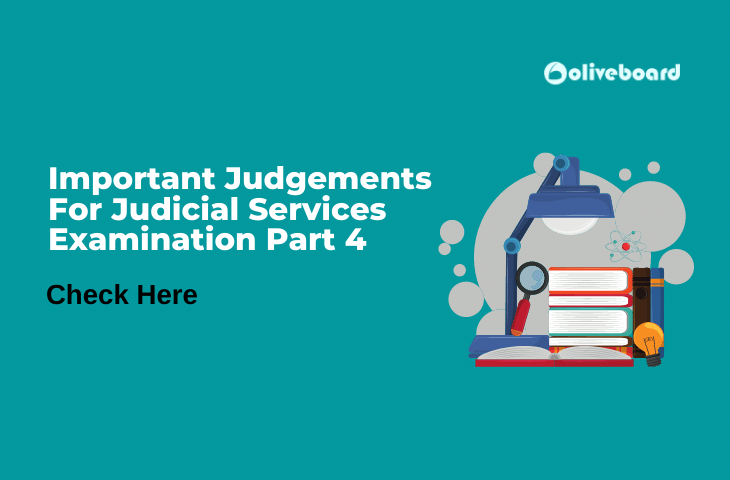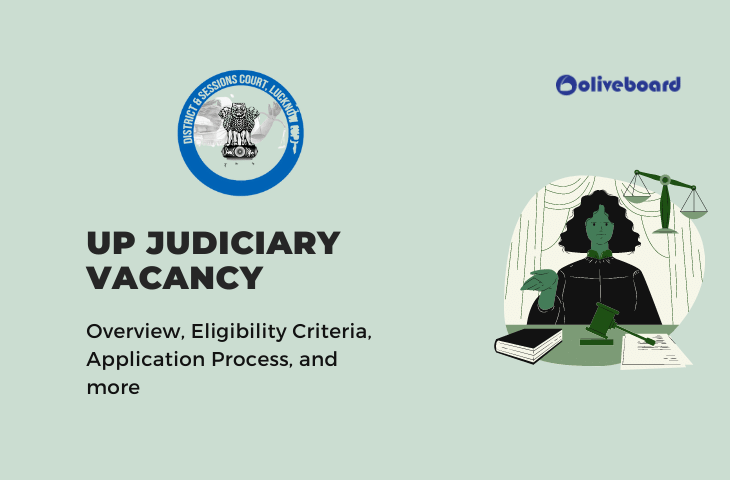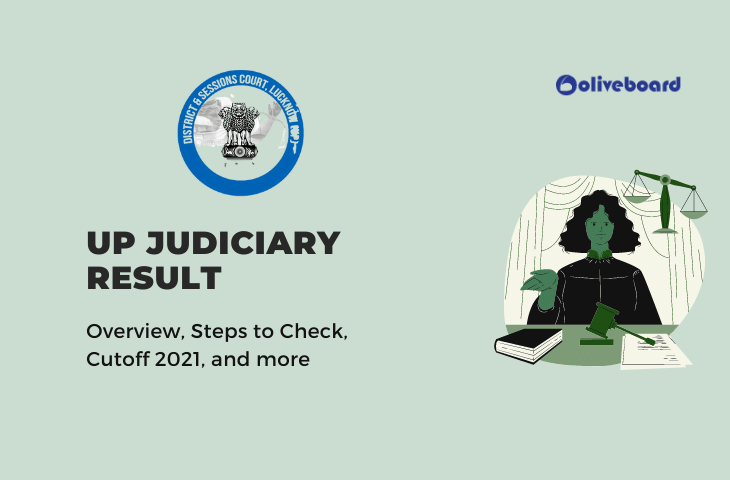The Constitution of India guarantees the Right to Life and personal liberty and recognizes this right as a fundamental right under Article 21 of The Constitution of India. A Right to Life does not mean mere animal existence and includes all those means and ways by which Life can be enjoyed. This article is very important for the Judicial Services Examination because its scope is expanded by the Supreme Court over time and expressions used under Article 21 of The Constitution of India are given liberal interpretation by the judiciary. The static questions asked in the examination are the meaning of expressions used and the current issues that are widening the ambit of Article 21 of The Constitution of India where the Supreme Court recognizes different rights as facets of the Right to Life. Therefore, it becomes very important for a judicial aspirant to read about landmark cases as well as recent ones to develop a full understanding of Article 21 of The Constitution of India.
ARTICLE 21: AN INEXHAUSTIVE SOURCE OF FACETS OF HUMAN RIGHTS
Article 21 of The Constitution of India provides that “No person shall be deprived of his life or personal liberty except according to the procedure established by law. This right is available to all persons- both citizens and non-citizens. The expressions ‘life’, ‘personal liberty’, and ‘procedure established by law’ have been given liberal interpretation over the period of time and to understand this concept, we have to read about the judgment passed in the journey of the Apex Court from A. K. Gopalan’s case to Maneka Gandhi’s case. The judicial precedents show that the scope and dimension of the provision have undergone a radical change through decades. At first, it is important for you to understand the meaning and scope of expressions used under Article 21 and then read on the different rights included within the ambit of the Fundamental Right to Life.
MEANING AND SCOPE OF THE EXPRESSION ‘LIFE’
The term ‘life’ means the state of being alive as a human. The meaning of the expression ‘life’ was expanded by Justice Bhagwati in the case of Francis Coralie vs. U.T. of Delhi, AIR 1981 SC 746, and he observed that the Right to Life includes the right to life with human dignity, and all the bare necessities of life such as nutritious food, clothes, shelter over the head, and facilities for reading, writing, and expressing oneself. Thus, the protection to life extends to all those limbs of the body by which life is enjoyed. In this case, the court held that a detenu has the right to interact with family members, friends, and his lawyer. Justice Bhagwati reiterated this view in the case of Bandhua Mukti Morcha vs. Union of India, AIR 1984 SC 802, and said that it is the fundamental right of everyone in this country to live with human dignity, free from exploitation and this right is enshrined in Article 21 of The Constitution of India. In this case, the court also held that the Right to Life includes the right to livelihood.
While discussing the Right to Life, it is important to co-relate it with the Directive Principles of State Policy given under Article 39(e), Article 39(f), Article 41, and Article 42 of The Constitution of India.
- Article 39(e) of The Constitution of India provides that ‘the health and strength of workers, men, and women, and the tender age of children are not abused and that citizens are not forced by economic necessity to enter avocations unsuited to their age or strength’;
- Article 39(f) of The Constitution of India provides that ‘children are given opportunities and facilities to develop in a healthy manner and in conditions of freedom and dignity and that childhood and youth are protected against exploitation and against moral and material abandonment’;
- Article 41 of The Constitution of India provides that ‘the State shall, within the limits of its economic capacity and development, make effective provision for securing the right to work, to education and to public assistance in cases of unemployment, old age, sickness and disablement, and in other cases of undeserved want’;
- Article 42 provides that ‘the State shall make provision for securing just and humane conditions of work and for maternity relief’. This positive obligation imposed upon the State by the Constitution of India shows the responsibility of the State to protect and take care of different facets of the life of the person i.e., citizens as well as non-citizens for the better enjoyment of life and not mere animal existence.
MEANING OF THE EXPRESSION ‘PERSONAL LIBERTY’
The term liberty means the freedom as per choice without too many limits from the Government or Authority. This term is qualified by the adverb personal making it a bit narrower. Even the Supreme Court took a very narrow view and restricted the meaning of expression ‘liberty’ to be confined to freedom from detention or physical restraint. A slightly wider view was taken in the case of Kharak Singh vs. Union of India, AIR 1963 SC 1295 by observing that personal liberty includes all varieties of rights. In the case of Maneka Gandhi vs. Union of India, AIR 1978 SC 597, Justice Bhagwati held that the expression ‘Personal Liberty’ is of wide amplitude covering a variety of rights that constitute personal liberty of man and some of them have protection under Article 19 of The Constitution of India. Article 19(1) of The Constitution of India protects the right to freedom and provides that ‘All citizens shall have the right
- to freedom of speech and expression;
- to assemble peaceably and without arms;
- to form associations or unions;
- to move freely throughout the territory of India;
- to reside and settle in any part of the territory of India; and
- to practice any profession, or to carry on any occupation, trade, or business.’
The feature of statutory bail is a facet of the right to protection of personal liberty.
MEANING OF THE EXPRESSION ‘PROCEDURE ESTABLISHED BY LAW’
Article 21 of The Constitution of India provides that a person shall be deprived of his life and personal liberty except according to procedure established by law. The issue was raised about the scope of the term ‘law’ used here, and whether this law refers to only enacted laws or includes other forms of laws as well. Here, it would be beneficial to refer to Article 13 of The Constitution of India for the definition of law. Article 13(3) of The Constitution of India states that law includes any Ordinance, order, bye-law, rule, regulation, notification, custom, or usages having in the territory of India the force of law. For the purpose of Article 21 of The Constitution of India, the law includes several other forms of law as well. It was held in the case of A. K. Roy vs. Union of India, AIR 1982 SC 710 that even an ordinance issued by executive authority is a law. For the purpose of Article 21 of The Constitution of India, there must be a law that establishes the procedure and the procedure must be strictly followed while depriving a person of his fundamental right to Life and personal liberty.
It was contested in the case of A. K. Gopalan vs. State of Madras, AIR 1950 SC 27 while challengingthe validity of the Preventive Detention Act, 1950 that law must be reasonable as per Article 19 of The Constitution of India and law incorporates the principle of natural justice. However, the Apex Court took a very narrow approach by holding that a law depriving personal liberty has to conform with Article 20 of The Constitution of India to Article 22 of The Constitution of India and not with Article 19 of The Constitution of India. The Court said that Article 20 to Article 22 of The Constitution of India embodies entire Constitutional protection with respect to Life and personal liberty. Article 20 of The Constitution of India provides for the ‘Protection in respect of conviction for offences’. It states that:
- No person shall be convicted of any offence except for violation of the law in force at the time of the commission of the act charged as an offence, nor be subjected to a penalty greater than that which might have been inflicted under the law in force at the time of the commission of the offence
- No person shall be prosecuted and punished for the same offence more than once
- No person accused of any offence shall be compelled to be a witness against himself.
Article 22 of The Constitution of India provides for the protection against arrest and detention in certain cases.
The court said that Article 19 of The Constitution of India comes into the picture when a right mentioned specifically under it is violated. It was held that the Preventive Detention Act 1950 need not meet the requirement of Article 19 of The Constitution of India and is valid as long as it meets the requirements of Article 22 of The Constitution of India.
A direct implication of this Supreme Court ruling was that Article 21 of The Constitution of India does not protect a citizen from competitive legislative action. This restricted view was overruled in the case of Maneka Gandhi vs, Union of India, AIR 1978 SC 587. In this case, the issue was raised that the passport of the appellant was impounded without giving a reasonable opportunity of hearing. The executive passed the order in the interest of the general public. In this case, the Supreme Court held that Articles 14, 19 and 21 of The Constitution of India are not mutually exclusive but interlinked and a law depriving a person of life and personal liberty has to conform with the requirements of these Articles. Thus, a law must establish a procedure and this procedure must be fair, reasonable, and non-arbitrary. Justice Krishna Iyer said that the spirit of a man is at the root of Article 21. Personal Liberty makes for the worth of a human person and travel makes liberty worthwhile. He further said that ‘Procedure in Article 21 means fair and not formal procedure and law is a reasonable law and not any enacted piece.’
Thus, the expressions of Article 21 of The Constitution of India have been given liberal interpretation over a period of time. The scope of Article 21 of The Constitution of India was further widened by including various other rights within its ambit establishing the fact that life means a dignified and healthy life. Various facets of Right to Life recognized by the judiciary which shaped Article 21is discussed below:
Right to Clean Environment
A pollution-free environment is the basis of life. It is the obligation of the state to protect and safeguard the environment as stated under Directive Principles of State Policy as provided under Article 47, 48A. Article 47 provides that ‘The State shall regard the raising of the level of nutrition and the standard of living of its people and the improvement of public health as among its primary duties and, in particular, the State shall endeavor to bring about prohibition of the consumption except for medicinal purposes of intoxicating drinks and of drugs which are injurious to health’. Article 48A provides that ‘The State shall endeavor to protect and improve the environment and to safeguard the forests and wildlife of the country’. The Constitution of India also imposes a fundamental duty upon citizens for protecting the environment and in this respect, Article 51A(g) provides that ‘it is a fundamental duty of every citizen to protect and improve the natural environment including forests, lakes, rivers, and wildlife, and to have compassion for living creatures’.
The Supreme Court went a step ahead by holding it as a part of Right to Life under Article 21 of The Constitution of India and observed that good quality of life depends upon basic ingredients of the environment like air, soil, and water. In the case of Subhash Kumar vs. State of Bihar, AIR 1991 SC 420, the Apex Court held that enjoyment of pollution and citizens have fundamental right to free environment is included in Right to Life under Article 21 and they can move to the Supreme Court under Article 32 for removal of pollution of water or air which may be detrimental to the quality of life. The Supreme Court evolved two principles in the case of Vellore Citizens Welfare vs. Union of India, AIR 1996 SC 2721- Precautionary Principle and Polluter Pays Principle. The first principle states that authorities must anticipate, prevent and counter causes of environmental degradation. The second principle means that a polluter who is engaged in hazardous activity is liable to compensate for the loss suffered by another person by such activity and the Supreme Court held that it can award damages under Article 32 against those who disturb the ecological balance. A series of judicial decisions followed after that Public Interest Litigation filed by the activist M.C. Mehta and directions were issued for the protection of the Taj Mahal, running of public transport on CNG and not on diesel. In the case of Murli S. Deora vs. Union of India, AIR 2002 SC 40, the Supreme Court issued directions to the government to ensure prohibiting smoking in public places. Thus, the judiciary has established the fact that any threat to ecology which may lead to violation of the right to enjoy healthy life is against Article 21.
Right to Livelihood
In the case of Olga Tellis vs. Bombay Municipal Corporation, AIR 1986 SC 180, the Supreme Court held that the Right to Life protected under Article 21 includes the Right to livelihood otherwise the easiest way of depriving a person of his right to life would be to deprive him of his means to livelihood to the point of degradation.
Right to Die
The issue was raised whether the right to life also includes the right to end life. In the case of P. Ratinam vs. Union of India, AIR 1994 SC 1844, it was held that the right to life includes the right to not to live a forced life and this Section 309, Indian Penal Code which provides that ‘whoever attempts to commit suicide and does any act towards the commission of such offence, shall be punished with simple imprisonment for a term which may extend to one year or with fine, or with both’ is unconstitutional. However, this decision was reviewed in the case of Gian Kaur vs. State of Punjab, AIR 1996 SC 946 where the constitutionality of Section 306, Indian Penal Code which provides punishment for abetment of suicide was challenged. It was held that Article 21 of The Constitution of India guarantees protection to life and personal liberty and by no stretch of imagination extinction of life can be read into the protection of life. Suicide is unnatural termination of life and cannot be treated as per natural life. Both sections were held to be constitutional. Whether the right to die with dignity is as one of the facets of the Right to Life guaranteed as a fundamental right under Article 21 of The Constitution of India was discussed in the case of Common Cause (A Registered Society) vs. Union of India, (2018) 13 SCC 440. It was held that the Right to Live with dignity under Article 21 includes the right to die in the case of a terminally ill patient or a person in a permanent vegetative state with no hope of recovery. however, this euthanasia cannot be equated with suicide.
Right to Speedy Trial
The protection of Article 21 of The Constitution of India extends to all persons including prisoners and under trials and the whole criminal justice system. In the case of Hussainara Khatoon vs. Home Secretary, State of Bihar, AIR 1979 SC 1369, the Apex Court held that speedy trial and free legal aid is within the ambit of Article 21 of The Constitution of India. The right of prisoners was also recognized in the case of Sunil Batra vs. Delhi Administration, AIR 1978 SC 1675 in which the Supreme Court held that solitary confinement of a prisoner who was awarded capital punishment is violative of Article 21 of The Constitution of India. Compulsory handcuffing of undertrials accused of a non-bailable offence punishable with more than three years imprisonment was held to be violative of Article 21 in the case of Prem Shankar Shukla vs. Delhi Administration, AIR 1980 SC 1535.
Right to Medical Care
Generally, in medico-legal cases, doctors refuse to treat the patient till legal formalities are completed. Taking strict action against this, the Supreme Court has held in the case of Parmanand Katara vs. Union of India, AIR 1989 SC 2039 that preservation of life is guaranteed under Article 21 and it is the duty of doctors to preserve life.
Right to Privacy
Right to privacy was held to be an intrinsic part of the Right to Life guaranteed under Article 21 of the Constitution in the case of Justice K. S. Puttuswamy vs. Union of India, AIR 2017 SC 4161. The Supreme Court held that the right to privacy is an inalienable right and covers all information about that person and choices made by him about reproduction, partners, movements, etc. This recognition will protect an individual from the scrutiny of the authorities about these choices. This is fundamental to life.
Conclusion
Thus, Article 21 of the Constitution of India was widened in scope through judicial interpretations. These are certain important judicial decisions on different dimensions of Article 21. It is suggested for you to go through all the facets of Article 21 and read in-depth about them, especially one in news.
- Bail in Case of Non-Bailable Offence
- Important Judgements For Judicial Services Examination
- Article 21: Important Judicial Decisions On Different Dimensions Of Article 21
- UP Judiciary Salary & Job Profile- Salary Structure, Stability, Promotion
- UP Judiciary Vacancy: Overview, Eligibility Criteria, Application Process
- UP Judiciary Result: Overview, Steps to Check, Cutoff 2021, and more

The most comprehensive online preparation portal for MBA, Banking and Government exams. Explore a range of mock tests and study material at www.oliveboard.in
